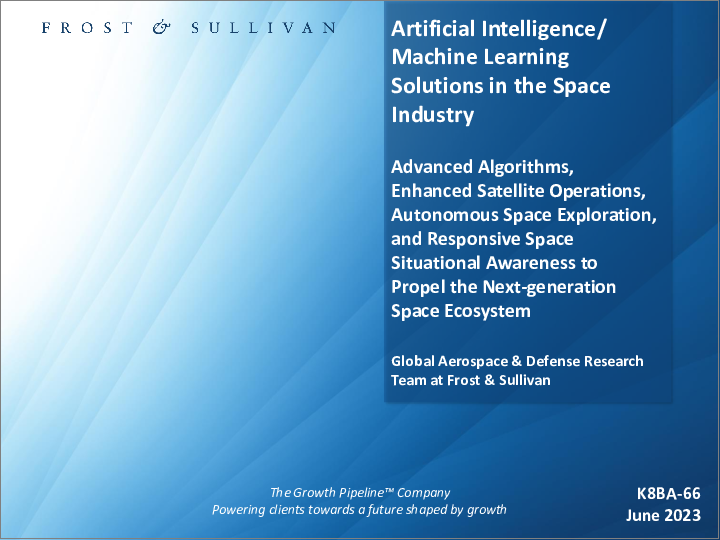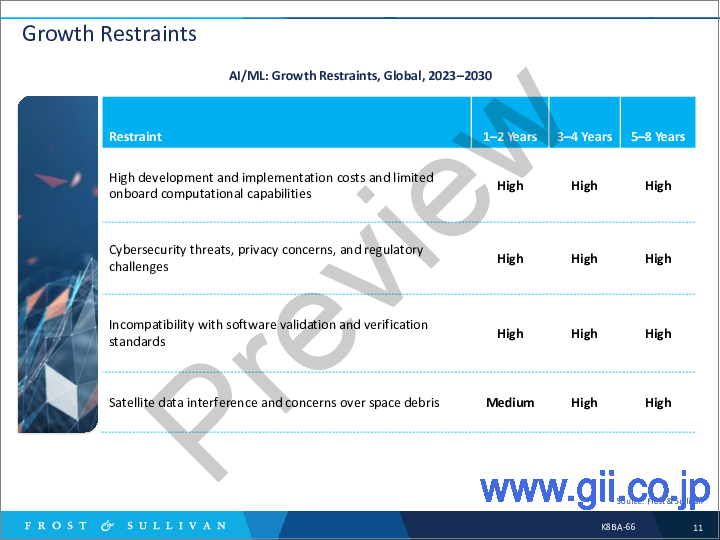|
|
市場調査レポート
商品コード
1296943
宇宙産業における人工知能/機械学習ソリューションArtificial Intelligence/Machine Learning Solutions in the Space Industry |
||||||
|
|||||||
| 宇宙産業における人工知能/機械学習ソリューション |
|
出版日: 2023年06月06日
発行: Frost & Sullivan
ページ情報: 英文 44 Pages
納期: 即日から翌営業日
|
- 全表示
- 概要
- 目次
高度なアルゴリズム、衛星運用の強化、自律的な宇宙探査、そして次世代宇宙エコシステムを推進するレスポンシブな宇宙状況認識
宇宙産業における人工知能(AI)と機械学習(ML)の統合は、とりわけ衛星運用、宇宙探査、宇宙状況認識を大幅に強化する可能性を秘めています。本レポートでは、衛星ネットワーク管理、衛星健康管理、姿勢軌道制御システム(AOCS)、宇宙天気モニタリングなど、宇宙産業の様々な側面におけるAI/MLの影響を調査しています。さらに、AI/ML技術や、処理能力や環境制約など、AI/ML技術を衛星に搭載する際の課題についても取り上げています。
宇宙産業の拡大、特に地球低軌道(LEO)衛星群の出現に伴い、AI/ML技術は複雑な衛星ネットワークの管理に役立っています。複数の属性を考慮した効率的なルーティング手順を可能にすることで、AI/MLアプリケーションは高品質なサービスと低遅延を保証します。さらに、AI/MLが提供する自律性の向上により、地上局の可用性への依存度が低下するため、衛星ネットワークの管理が合理化され、リソースの利用が最適化されます。
AI/ML技術は、地上オペレータへの依存を最小限に抑え、より正確な故障予測を提供することで、衛星の健全性管理の分野でも有望視されています。膨大なデータセットを効率的に分析し、リアルタイムの故障予測を提供する能力により、タイムリーな緩和措置の実施や衛星コンポーネントのライフサイクル延長の可能性があります。まだ開発の初期段階ですが、AI/ML技術は、衛星の健全性管理の強化を通じて、宇宙ミッションの安全性と成功を大幅に向上させる態勢を整えています。
最後に、AOCSと宇宙天気モニタリングにおけるAI/MLアプリケーションは、従来の方法よりも大きな利点を提供します。AIベースの星識別は、ロバストで迅速かつ正確な姿勢決定を可能にし、AIで強化された宇宙天気モニタリングは、包括的なデータ収集と迅速な情報発信を容易にします。宇宙産業が進化を続ける中、AI/ML技術は、宇宙運用、探査、安全保障に関連する複雑さと課題の増大に対処する上で、ますます重要な役割を果たすことになるでしょう。
目次
戦略的課題
- なぜ成長が難しくなっているのか?
- The Strategic Imperative 8(TM)
- 宇宙産業における人工知能(AI)および機械学習(ML)に対する上位3つの戦略的重要事項の影響
- 成長機会がGrowth Pipeline Engine(TM)を後押しします。
成長機会の分析
- 衛星ペイロード向けAIアプリケーション
- 衛星プラットフォーム向けAIアプリケーション
- 宇宙産業におけるAI技術
- 宇宙産業における教師あり学習技術
- 宇宙産業における半教師あり、教師なし、RL技術
- 宇宙産業におけるニューラルネットワーク(NN)技術
- 宇宙産業におけるNLP、エキスパートシステム、視覚技術
- 宇宙産業におけるロボティクス
- 衛星搭載AIアプリケーションの成功例
- 人工衛星搭載AIアプリケーションの課題-宇宙環境
- 人工衛星搭載AIアプリケーションの課題-衛星設計
- 宇宙産業におけるAI活用-衛星ネットワーク管理
- 宇宙産業におけるAI活用-衛星の健康管理
- 宇宙産業におけるAI利用-姿勢軌道制御システム(AOCS)
- 促進要因
- 促進要因分析
- 成長抑制要因
- 成長阻害要因分析
成長機会ユニバース
- 成長機会1:スペースデブリの追跡と軽減
- 成長機会2:宇宙船の自律性とナビゲーション
- 成長機会3:宇宙探査と資源探査
- 図表一覧
- 免責事項
Advanced Algorithms, Enhanced Satellite Operations, Autonomous Space Exploration, and Responsive Space Situational Awareness to Propel the Next generation Space Ecosystem
The integration of artificial intelligence (AI) and machine learning (ML) within the space industry has the potential to significantly enhance satellite operations, space exploration, and space situational awareness, among other areas. This report investigates the impact of AI/ML on various aspects of the space industry, including satellite network management, satellite health management, attitude and orbit control systems (AOCS), and space weather monitoring. Additionally, the report addresses AI/ML techniques and challenges associated with implementing AI/ML technologies onboard satellites, such as processing capabilities and environmental constraints.
As the space industry expands, particularly with the emergence of low-Earth orbit (LEO) satellite constellations, AI/ML technologies have become instrumental in managing complex satellite networks. By enabling efficient routing procedures that consider multiple attributes, AI/ML applications ensure high-quality service and low latency. Furthermore, the increased autonomy provided by AI/ML reduces the reliance on ground station availability, thus streamlining satellite network management and optimizing resource utilization.
AI/ML technologies also hold promise in the field of satellite health management by minimizing dependence on ground operators and providing more accurate fault predictions. The capacity to efficiently analyze extensive datasets and offer real-time fault predictions allows for the implementation of timely mitigation measures and the potential extension of satellite component lifecycles. Although still in the early stages of development, AI/ML technologies are poised to significantly improve the safety and success of space missions through enhanced satellite health management.
Lastly, AI/ML applications in AOCS and space weather monitoring offer substantial advantages over traditional methods. AI-based star identification enables robust, rapid, and precise attitude determination, while AI-enhanced space weather monitoring facilitates comprehensive data collection and expeditious information dissemination. As the space industry continues to evolve, AI/ML technologies are set to play an increasingly crucial role in addressing the growing complexities and challenges associated with space operations, exploration, and security.
Table of Contents
Strategic Imperatives
- Why is it Increasingly Difficult to Grow?
- The Strategic Imperative 8™
- The Impact of the Top 3 Strategic Imperatives on Artificial Intelligence (AI) and Machine Learning (ML) in the Space Industry
- Growth Opportunities Fuel the Growth Pipeline Engine™
Growth Opportunity Analysis
- AI Applications for Satellite Payloads
- AI Applications for Satellite Platforms
- AI Techniques in the Space Industry
- Supervised Learning Techniques in the Space Industry
- Semi-supervised, Unsupervised, and RL Techniques in the Space Industry
- Neural Network (NN) Techniques in the Space Industry
- NLP, Expert Systems, and Vision Techniques in the Space Industry
- Robotics in the Space Industry
- Successful Applications for AI Onboard Satellite Payloads
- Challenges for AI Application Onboard Satellites-Space Environment
- Challenges for AI Application Onboard Satellites-Satellite Design
- AI Application in the Space Industry-Satellite Network Management
- AI Application in the Space Industry-Satellite Health Management
- AI Application in the Space Industry-Attitude and Orbit Control System (AOCS)
- Growth Drivers
- Growth Driver Analysis
- Growth Restraints
- Growth Restraint Analysis
Growth Opportunity Universe
- Growth Opportunity 1: Space Debris Tracking and Mitigation
- Growth Opportunity 2: Spacecraft Autonomy and Navigation
- Growth Opportunity 3: Space Exploration and Resource Identification
- List of Exhibits
- Legal Disclaimer





